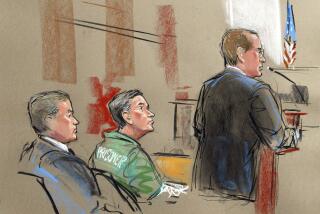Needed the Job, Hasenfus Tells Court : Admits Helping to Fly Arms to U.S.-Backed Contras for the Money
- Share via
MANAGUA, Nicaragua — Emphasizing his recent unemployment, American prisoner Eugene Hasenfus admitted in court Tuesday that he agreed to help fly arms to the U.S.-backed contras in Nicaragua because he needed the $3,000-a-month job.
Under questioning from his attorney, Hasenfus said his job was “only that of a load master” and that he had no responsibility in planning or designing the supply flights to the rebels fighting the Marxist Sandinista government.
Hasenfus’ attorneys are trying to show “mitigating circumstances” to seek a lenient sentence from the People’s Anti-Somocista Tribunal.
He Was Out of Work
Hasenfus, 45, a construction worker from Marinette, Wis., could face up to 30 years in prison if convicted on charges of terrorism, violation of a law on public order and security and illicit association for criminal purposes.
He was shot down in southern Nicaragua on Oct. 5 in a C-123 cargo plane carrying arms, ammunition and supplies. Two other Americans on board, pilot William J. Cooper and co-pilot Wallace Blaine Sawyer, were killed in the crash, as was an unidentified Nicaraguan radio operator.
Hasenfus, the father of three, testified that when Cooper telephoned him last July to recruit him for the job, he was out of work.
“In 1985-1986, construction iron work was very slow. During this time I was working on and off. Mainly I was not working. I was unemployed. My unemployment compensation, all my benefits, had run out. So when William Cooper called back with his offer for work, I accepted,” Hasenfus said.
Backs Off CIA Charge
He said his job was to push cargo out of the airplanes. He was paid an extra $750 each time he flew over Nicaraguan territory.
Apparently on the advice of his attorneys, Hasenfus has backed off of his charge that the operation was directed by the CIA. Under questioning from the prosecution, Hasenfus said he worked for Corporate Air Services, a Miami transport company, and that he did not know whom Cooper and the other managers of the operations worked for.
In interviews with journalists, Hasenfus had said he believed he was working for the CIA in the supply operations and was angry that the U.S. government was not helping him mount his defense. He has said that Cooper told him two Cuban-Americans in the El Salvador end of the supply operation had worked for the CIA.
Former U.S. Atty. Gen. Griffin Bell, who is advising the defense, had said Hasenfus would throw himself on the mercy of the court Tuesday, but the president of the tribunal would not allow Hasenfus to read the testimony Bell and the other attorneys had written for him.
Instead, Hasenfus dispassionately recounted how he was recruited and described the missions he participated in from El Salvador and Honduras, including the one in which his plane was shot down.
Hasenfus’ Nicaraguan attorney, Enrique Sotelo Borgen, attempted to show through his questioning that Hasenfus had no role in directing the supply operation and no political interest in the contras’ cause.
“If you are condemned and sentenced, will you ask the government to be generous and demonstrate compassion so you can return home with your wife and small children?” Sotelo asked.
“Yes, I would,” Hasenfus responded.
The prosecution is pushing for the maximum penalty of 30 years.
“He has still committed a crime, even though he is a worker,” said Ivan Villavicencio, one of the prosecuting attorneys.
Another former U.S. attorney general, Ramsey Clark, who observed the proceedings, added, “If unemployment were a defense to crime, most people in American prisons would have to be released.”
Clark opposes the U.S. role in the contras’ war. He said that while Hasenfus’ tragedy was visible in the courtroom, “What you don’t see is the tragedy of thousands of Nicaraguans killed by the contras and arms and ammunition supplied by the United States government and those acting in concert.”
Sandinista leaders do not discount the possibility that Hasenfus might be released after a conviction as a good-will gesture, but the prosecution argues that would be a slap in the face to soldiers fighting the contras and to the families of those who have been killed in the war.
More to Read
Sign up for Essential California
The most important California stories and recommendations in your inbox every morning.
You may occasionally receive promotional content from the Los Angeles Times.











